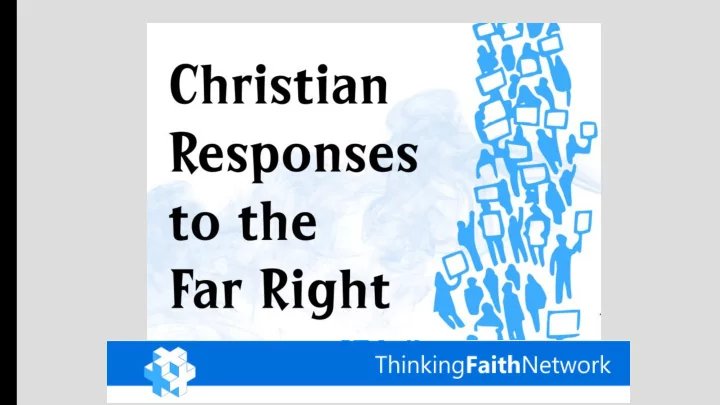

• Intellectual Origins: New Right (Bar-On 2001) • Sociological Origins: Silent Counter-Revolution to Post-Materialism (Ignazi 1992 & 2003) • Political Origins: Cartelisation of Mainstream Parties (Katz and Mair 1995) • Economic Origins: Discontents with economic globalisation (Betz 1994)
• ‘Terminological Chaos’ 26 definitions & 58 different features (Mudde 1996 & 2007) • Some prefer right-wing populist, far right or extreme right. – However, the radical right provides ‘a critique of the constitutional order without any anti-democratic behaviour or intention. ’ (Carter 2005: 22) – In contrast to extreme right, who ‘espouse violence’ and ‘ seek the overthrow of liberal democracy. ’ (Eatwell 2003: 14) – This makes the radical right both more difficult to place and response to. • Key ideological features: nativism , authoritarianism and populism .
1. Paramilitary Style Organisations 2. Social Movements 3. Political Parties
% vote in EU % vote in national Seats in Parliamentary Seats in EU parliamentary national Country Party Name Elections Parliament elections parliament % change Austrian Freedom Party Austria (FPO) 19.72% 4 20.50% 40 + 5.5% - 4.07% Belgium Flemish Interest (VB) 4.26% 1 3.67% 3 Bulgaria Ataka (PPA) 2.96% 0 9.07% 27 + 1.7% Czech Republic Worker’s Party of Social 0.52% 0 0.2% 0 - 0.66% Justice (DSSS) Denmark People’s Party (O) 26.5% 4 21.1% 37 + 8.8% France National Front (FN/RN) 24.85% 24 8.75% 8 + 5.09% Germany Alternative für 7.1% 7 12.6% 94 + 7.9% Deustchland (AfD) Greece Golden Dawn (XA) 9.4% 3 6.3% 17 + 0.7% Hungary Jobbik (JMM) 14.67% 3 19.06% 23 - 1.16% Italy Northern League (LN) 6.15% 5 17.35% 37 + 13.9% Lithuania Order and Justice (PTT) 14.25% 2 7.63% 11 - 2.08% Netherlands Party for Freedom 13.3% 4 13.1% 20 + 3.0% (PVV) Poland Self-Defence of the 0.04% 0 0.03% 0 - 0.04% Republic of Poland (SRP) Slovakia Slovak National Party 3.61% 0 8.6% 15 + 4.1% (SNS) United Kingdom UK Independence Party 26.6% 24 1.8% 0 − 10.8% (UKIP) Average Radical Right Parties 11.6% 5.4 9.98% 22.13 + 3.05%
• Ideology – Clash of Civilisation’s narrative, Eurabia Conspiracy Theory, appeals to emotive issues around tradition. • Practice – use of Christian iconography, overt Christian rhetoric, and Christian symbols as a way of othering Muslims. • Support Base – minority of electorate are religious, vaccination effect (Arzheimer and Carter 2009 ), importance of ‘socio - cultural’ aspects of Christianity (Billiet1995).
Case Study I: Anders Breivik Case Study 1I: Britain First Case Study III: Viktor Orbán
• Anti-Islamic Protest: context, origins and scholarship. • 5 in-depth case studies – focusing on Birmingham, Bradford, Leicester, Luton and Tower Hamlets. • 58 semi-structured elite interviews – with politicians, police and behind-the-scenes council officials. • Findings: responses to anti-Islamic protest have varied – mainly exclusionary but some inclusionary also . • Argument: inclusion, however, only viable strategy to address far right groups in a sustainable way.
• 1930s Christian Anti-Fascism in the East End – 1936 Battle of Cable Street Rev. John Grosner • 1990s Christian Anti-Fascism in the Isle of Dogs – 1993 Millwall By-Election St. Edmund’s RCC • Contemporary Christian Responses in Tower Hamlets – English Defence League Protests (2009, 2011 & 2013) – Britain First Demonstrations (2014, 2015 & 2016) Rev. Alan Green
• Contemporary Christian Responses in Luton – English Defence League Protests (2009, 2011, & 2012) – Britain First Demonstrations (2014, 2015, & 2016) Peter Adams – Emphasis on ‘redefining the centre’ & intercultural relations. St Mary’s Luton
Broad Approach – Holistic (small ‘l’ liberal) Christian Anti -Fascism • Church – debunking & disrupting the ‘Christianist’ narratives & iconography used by Populist Radical Right groups in their campaigns. • Churches – engaging in cross-community projects that break down tendencies towards social polarisation and isolationism. • Christians – avoiding the divisive, identity politics of the populist radical right.
• Arzheimer, Kai and Carter, Elizabeth (2009 ) ‘Christian Religiosity and Voting for West European Radical Right Parties.’ West European Politics 32(5): 985-1011. • Billiet, J (1995) ‘Church Involvement, Ethnocentrism, and Voting for a Radical Right-Wing Party.’ Sociology of Religion 56(3): 303 – 326. • Carter, Elisabeth (2005) The Extreme Right in Western Europe. Manchester: Manchester University Press. • Copsey, N. (2017) Anti-Fascism in the UK. 2 nd Edition. London: Routledge. • Lawson T. (2010) ‘I was following the lead of Jesus Christ’: Christian Anti -Fascism in 1930s England’. In: Copsey N., Olechnowicz A. (eds) Varieties of Anti-Fascism. Palgrave Macmillan, London. • Mickenberg , M. (2018) ‘Religion and the Radical Right.’ In: Rydgren, J. (ed.) The Oxford Handbook of the Radical Right. Oxford: Oxford University Press. • Mudde, Cas (2007) Populist Radical Right Parties in Europe. Cambridge: Cambridge University Press.
Recommend
More recommend